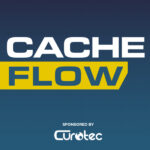This episode, Digital Marketing Serial Entrepreneur Rich Masterson talks about the cycles of venture capitalism, how the ad tech world is evolving, and the nuances of culture and ethics in business.
This episode, Digital Marketing Serial Entrepreneur Rich Masterson talks about the cycles of venture capitalism, how the ad tech world is evolving, and the nuances of culture and ethics in business.
Description
Rich Masterson is a Digital Marketing Serial Entrepreneur, Internet Pioneer, Board Member, Founder, and CEO.
Here are a few of the topics we’ll discuss on this episode of Cache Flow:
- How ad space has evolved in response to the changes in cookies.
- The polarization of the internet.
- How the ad tech world is evolving.
- Identity grabs that don’t use cookies.
- The lack of regulation in the ad space.
- The cycle of venture capitalism.
- The benefits of starting a company during a recession.
- Culture and ethics in business.
- Why Google removed ‘don’t do evil’ from their mission statement.
Resources:
Connect with Rich Masterson:
Connecting with the host:
- Brian Dainis on Linktree
Quotables
- 5:18 – “The entire digital landscape migrated into using either our technology or similar technologies and I have very mixed emotions about it because on the one hand it was very successful, it was a financial win for myself, Jeff, and all of the employees, on the other hand, I do think it contributes to the polarization that we see in our politics.”
- 12:31 – “The influencer network, there’s literally children making millions of dollars and opening up toys, there are influencers in every category and it’s just a fascinating explosion of new media that was nowhere to be found in 2007.“
- 18:36 – “The entrepreneurs that are coming up, maybe even those that are watching this podcast, they’re not presented with the lunch bucket guy who’s really working his butt off, frankly it’s someone like you and I’m not trying to blow smoke but you’ve been at it for a whole lot of years now, you’re up to 100 or more employees all around the world, frankly you should be celebrated not the guy or the girl who closed the 10 million dollars round and still has no revenue and I’d really like the pendulum to swing back to real reality, not the Kardashian entrepreneurs.”
- 21:28 – “I’ve started all my successful internet businesses in recessions. I don’t think it’s a coincidence, it’s like the concept of having vintages of wine in a certain year, the conditions were great, the weather and the sun, the clouds were right and the grapes whatever. During recessions, you have access to the cheapest talent, and it’s the hardest to raise money and its the hardest to acquire customers so you better have a good business model and if you do then you have access to the best and cheapest talent so when you come out of that two-three years later and your business is solid you just take off while everyone else is trying to catch up.
- 25:55 – “I’ve been very fortunate and I don’t know if my story is exciting as Elizabeth Holmes, but it’s genuine and it’s authentic and I’ve made a lot of people a lot of money including investors and my employees and I take a great amount of pride in the fact that it has done by the books so to speak.”
- 34:27 – “Whether it’s Enron, or Elizabeth Holmes, or FTX you’re telling me there’s nobody in the room who has the moral courage to say excuse me, wait a second, I read today somebody lost 2 million dollars, their life savings on FTX, is there nobody in the room who’s going to stand up and say stop this is wrong?”
- 38:38 – “Every company I’ve started has had the same mission statement and the mission statement is to be the kind of company that we would like our friends, family and children to work, because what kind of company do you want your children to work at? Presumably, at a profitable company, you want them to work at an ethical company, you want them to work at a company that has some concern about their community.”





